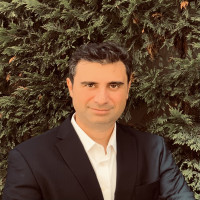Research Article
Issue Editorial Board



He was born in Istanbul in 1963, completed his primary, secondary, and high school education there. He graduated from the Department of Civil Engineering at Yıldız (Technical) University in 1985. He began his master's degree in Transportation at the Institute of Science at the same institution and completed it in 1987. Meanwhile, he began working as a research assistant in the Transportation Division of the Civil Engineering Department. He then enrolled in the Transportation PhD program at the same institution. Between 1990 and 1994, he conducted research on train scheduling at the Civil Engineering Department of Queen's University in Ontario, Canada, and at the Canadian Institute of Guided Ground Transport (CIGGT). Upon his return to Turkey, he completed his doctoral program in 1996. He began his teaching position in the Transportation Division of the Civil Engineering Department of Yıldız Technical University that same year, and continues to teach undergraduate and graduate courses. He focuses his research on the planning and operation of highway and railway transportation, with an interest in public transportation and sustainable transportation. He publishes his research in national and international journals and presents them at congresses.
Aim & Scope
Turkish Journal of Civil Engineering (TJCE), a non-profit, open access scientific and technical periodical of UCTEA Chamber of Civil Engineers, publishes papers reporting original research work and major projects of interest in the area of civil engineering. TJCE annually publishes six issues and is open to papers in English and Turkish. Both printed and electronic versions of the journal are presented to the service of the civil engineering community. It should be noted that TJCE (formerly, Teknik Dergi/Technical Journal of Turkish Chamber of Civil Engineers) is being published regularly for more than 30 years since 1990 and is indexed by Web of Science (Journal Citation Indicator: 0.14 - 2021) and Scopus (CiteScore: 1.2 – 2022), among others.
The main objective of Turkish Journal of Civil Engineering is to inform the Turkish and international civil engineering communities, primarily the members of the Turkish Chamber of Civil Engineers about the recent scientific and technical developments, thus to contribute to the betterment of the civil engineering practice and to the improvement of the profession. In other words, to establish a bridge between the world of research and the world of practice.
Its bi-lingual character enables an easy access to those Turkish civil engineers who prefer to read in Turkish and at the same time to make itself heard internationally and thus to reach the civil engineering community globally.
The scope of Turkish Journal of Civil Engineering is naturally confined with the subjects falling in the area of civil engineering. However, the area of civil engineering has recently been significantly enlarged, even the definition of civil engineering has somewhat changed.
Half a century ago, engineering was simply defined as “the art of using and converting the natural resources for the benefit of the mankind”. Today, the same objective is expected to be realised (i) by complying with the desire and expectations of the people concerned and (ii) without wasting the resources and within the sustainability principles. This change has required an interaction between engineering and social and administrative sciences. Some subjects at the borderline between civil engineering and social and administrative sciences have consequently been included in the area of civil engineering.
Turkish Journal of Civil Engineering defines its scope in line with this understanding. However, it requires the papers falling in the borderline to have a significant component of civil engineering.
Author Guidelines
- The manuscript (text, charts, equations, drawings etc.) should be arranged in Word and submitted in ready-to-print format. The article should be typed on A4 (210 x 297 mm) size paper using 10 pt (main title 15 pt) Times New Roman font, single spacing. Margins should be 40 mm on the left and right sides and 52.5 mm at the top and bottom of the page.
- Including drawings and tables, articles should not exceed 25 pages, technical notes 10 pages. Drawings and tables should be clear and legible; should not use characters smaller than 8 pt.
- A correct language conforming to the grammar rules should be used in drafting the manuscript. Third singular person and passive tense must be used, and no inverted sentences should be contained. Line numbers should be used throughout the text.
- Title must be short (10 words maximum) and clear, and reflect the content of the paper.
- Sections should be arranged as: (i) abstract and keywords, (ii) main text, (iii) symbols, (iv) acknowledgements and (v) references.
- The abstract should briefly describe the object, scope, method and conclusions of the work and should not exceed 100 words. If necessary, abstract may be modified without consulting the author. At least three keywords must be given. Manuscript title, full names of authors, their affiliations and e-mail addresses should appear in the first page.
An English abstract accompanied by English title and English keywords must be given before the abstract in manuscripts in Turkish. - Symbols must conform to the international rules; each symbol must be defined where it appears first, additionally, a list of symbols must be given in alphabetic order (first Latin, then Greek alphabets) at the end of the text, before References.
- Equations must be numbered using numbers given in brackets at the end of the line.
- Tables, drawings and photographs must be placed inside the text, each one should have a number and title. Titles should be written above the tables and below the drawings and photographs.
- Only SI units must be used in the manuscripts.
- Quotations must be given between inverted commas and the source must be indicated with a reference number.
- Acknowledgement must be short and mention the people/ institutions contributed or assisted the study.
- References must be numbered (in brackets) in the text referring to the reference list arranged in the order of appearance in the text. References must include the following information:
If the reference is an article: Author’s surname, his/her initials, other authors, full title of the article, name of the journal, volume, issue, starting and ending pages, year of publication.
Example: Naghdi, P. M., Kalnins, A., On Vibrations of Elastic Spherical Shells. J. Appl. Mech., 29, 65-72, 1962.
If the reference is a book: Author’s surname, his/her initials, other authors, title of the book, volume number, editor if available, place of publication, year of publication.
Example: Kraus. H., Thin Elastic Shells, New York. Wiley, 1967.
If the reference is a conference paper: Author’s surname, his/her initials, other authors, title of the paper, title of the conference, location and year.
If the source is a thesis: Author’s surname, his/her initials, thesis title, level, university, year.
If the source is a report: Author’s surname, his/her initials, other authors, title of the report, type, number, institution it is submitted to, publication place, year. - Discussions to an article published in Turkish Journal of Civil Engineering should not exceed two pages, must briefly express the addressed points, must criticise the content, not the author and must be written in a polite language. Authors’ closing remarks must also follow the same rules.
- Copyright has to be transferred to UCTEA Turkish Chamber of Civil Engineers. The standard “copyright form” signed by the authorised author and the standard “statement of originality” signed by all authors should be submitted together with the manuscript.
- A separate note listing authors’ names, business and home addresses and phone numbers and their brief resumes should accompany the manuscript.
- The manuscript must be submitted through the DergiPark system. (https://dergipark.org.tr/tekderg)
Ethical Principles and Publication Policy
TURKISH JOURNAL OF CIVIL ENGINEERING CODE OF ETHICS
The Chamber of Civil Engineers is the publisher and its President is the official owner of Turkish Journal of Civil Engineering. The Editorial Board is appointed by the Executive Board and is responsible to define and implement the publication principles. The Board Chair is the Editor and The Board Members act as Area Editors. The Editorial Board is the sole authority in all matters concerning publication.
Under the current publication principles, the reviewers who evaluate the manuscripts are engaged as consultants. The reviewers are proposed by the area editors and appointed by the Editorial Board. Single blind review process is adopted, reviewers know the authors, authors do not know the reviewers. The area editors oversee the review process and act as rapporteurs to the Editorial Board summarising the review reports. The final accept/decline decisions are taken by the Editorial Board considering the rapporteur proposals.
The principles of ‘publication ethics’ observed in this activity have been inspired by the principles of the “Committee on Publication Ethics (COPE)”. The duties and the ethical responsibilities of each party involved in the publication of Turkish Journal of Civil Engineering are summarised below.
Duties and Ethical Responsibilities of the Authors
- Original papers are published. Originality has been defined in the Publication Principles.
- The work reported by the manuscripts should comply with the principles of research ethics.
- Manuscripts should be free of conflicts of interest. Unclear cases should be honestly declared.
- Authors should be prepared to present the raw data to the Editorial Board, if requested.
- A work under evaluation by another journal cannot be submitted to Turkish Journal of Civil Engineering.
- Persons who made no intellectual contribution to the work cannot appear as authors.
- Consents are needed of the persons who made intellectual contribution, if they are not authors.
- Once the manuscript is submitted to Turkish Journal of Civil Engineering, author names cannot be added or removed.
- Unethical conduct leads to rejection and future manuscripts by its authors are not accepted.
Duties and Ethical Responsibilities of the Reviewers
- The reviewer should decline the request unless he/she is fully confident of his/her expertise.
- Should perform the review in full impartiality and confidentiality and without prejudice.
- Should inform the area editor of any indications of conflict of interest or unethical conduct.
- Should adopt a constructive approach and use a careful language not to offend the authors.
- Should carefully observe the review time table specified.
Duties and Ethical Responsibilities of the Area Editors
- Area editors carefully observe the publication principles and procedures of Turkish Journal of Civil Engineering.
- Carefully consider the expertise, competence and experience of the reviewers they propose.
- Help the authors and reviewers by providing guidance whenever needed.
- Evaluate the reviewer reports with scientific accuracy and impartiality.
Duties and Ethical Responsibilities of the Editorial Board
- The Editorial Board reviews the publication principles considering the changing demands.
- Carefully considers the expertise, competence and experience of the reviewers it appoints.
- Continuously observes and directs the review progress, appoints new reviewers if needed.
- Takes accept/decline decisions with accuracy and impartiality considering area editor reports.
- Takes decisions concerning ethical questions and unusual requests.
Duties and Ethical Responsibilities of the Chamber of Civil Engineers
- The Chamber of Civil Engineers observes the principles of professional ethics in its activities.
- For each term, TCCE Executive Board appoints the Turkish Journal of Civil Engineering Editorial Board.
- Executive Board evaluates the publication policy change proposals of the Editorial Board.
- Executive Board evaluates the administrative and financial requests of Turkish Journal of Civil Engineering.
Price Policy
No fee is charged from the author or institution under any name.




